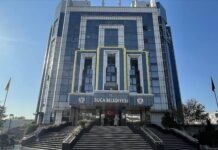According to reports in Turkish media, Turkey and the European Union (EU) has suspended political meetings until June. The EU and Turkey are not planning to hold any talks at a political level until the start of summer, reported Hurriyet Daily News.
Turkey and the EU had been expected to hold a leader’s summit, along with political, economy and energy dialogue meetings, all on the ministerial level. The gatherings were first postponed until the April 16 referendum in Turkey and then until June.
In February, Ankara and Brussels discussed holding a Turkey-EU summit at the leaders’ level in either late May or early June with a positive agenda. Along with political talks with Turkey’s autocratic President Recep Tayyip Erdoğan, EU leaders also expected to authorize the commission to start customs union talks with Ankara by July 1. However, Germany made clear to its EU partners that “there will be no such summit until German elections in September and that no action will be taken on visa liberalization for Turkish nationals.”
Ankara will also not participate politically in a meeting on Syria in Brussels organized by the EU on April 4-5 amid simmering tension with the bloc. Turkey is not attending the “Support of Syria and the Future of the Region” meeting, which is being organized under the auspices of the EU, Germany, Kuwait, Norway, Qatar, the United Kingdom and the United Nations, on a political level because it is not satisfied with an EU response over the format of the meeting and its own title.
Turkey’s attendance at the conference was greatly anticipated since it is home to the largest number of Syrian refugees, around 3 million. But the EU’s foreign policy chief, Federica Mogherini, said April 3 that Turkish Prime Minister Binali Yıldırım had not replied to the invitation, even though his counterparts in Jordan and Lebanon were set to attend.
The EU expects UN Secretary-General Antonio Guterres attend along with Staffan de Mistura, his special envoy who is mediating the Syria peace talks. The United States and Russia, meanwhile, are represented by junior officials or diplomats, not ministers.
April 5, 2017















